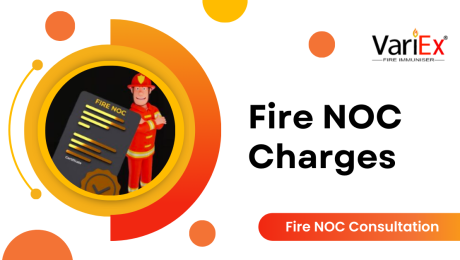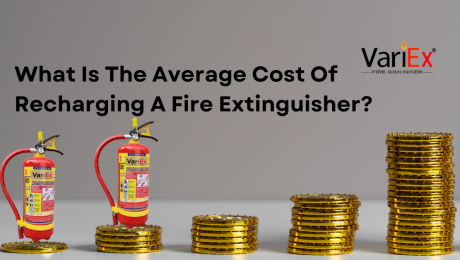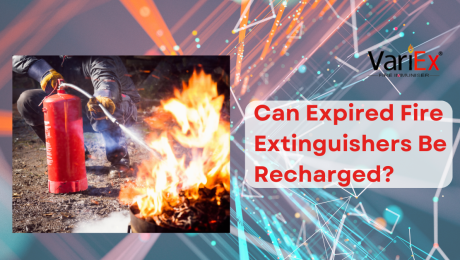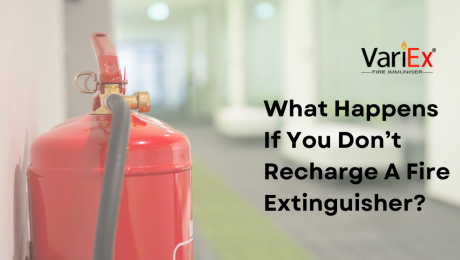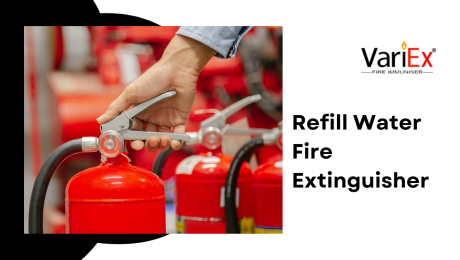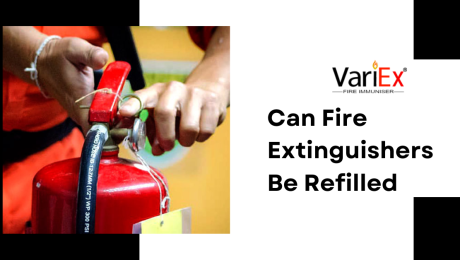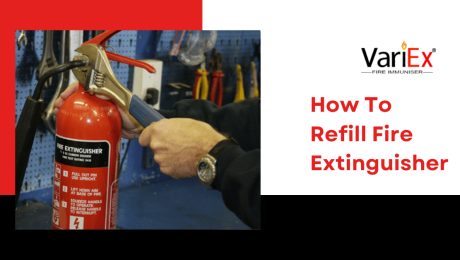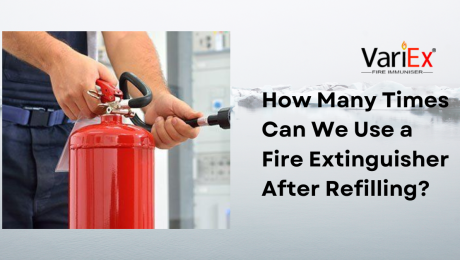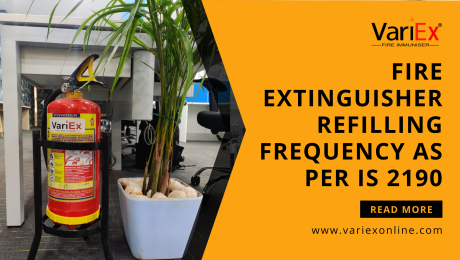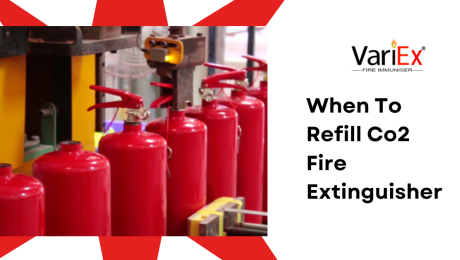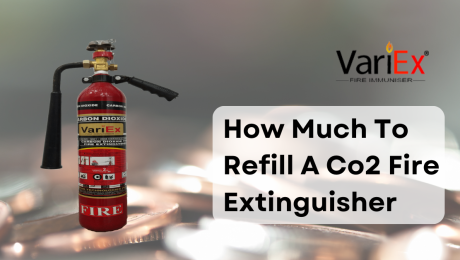Fire prevention is a critical aspect of ensuring the safety of lives and property. It involves adopting proactive measures to mitigate the risk of fires before they occur. Key strategies include installing and maintaining smoke detectors, fire extinguishers, and sprinkler systems. Educating individuals on fire safety practices, such as proper use of electrical equipment and safe handling of flammable materials, is crucial. Regular inspections of electrical systems, heating sources, and appliances contribute to identifying potential fire hazards. Implementing a comprehensive fire preventions plan in homes, businesses, and public spaces is essential. This includes emergency evacuation procedures, fire drills, and clear signage for fire exits. By prioritizing fire prevention, communities can significantly reduce the likelihood of fires, safeguarding lives and property while promoting a secure and prepared environment.
Refillable Water Fire Extinguisher
Monday, 26 February 2024 by Sonu Shree
- Published in Fire Extinguisher
No Comments
Fire NOC Charges
Tuesday, 30 January 2024 by Sonu Shree
A Fire NOC (No Objection Certificate) is a crucial document issued by the fire department, ensuring compliance with fire safety regulations and measures. The Fire NOC Charges refer to the fees associated with obtaining this certificate. These charges vary depending on the size and nature of the establishment. They encompass the costs associated with conducting fire safety inspections, providing necessary documentation, and offering expert guidance on fire protection systems and procedures. The Fire NOC Charges are essential investments that contribute to the overall safety of a building, its occupants, and neighboring properties. It is crucial for businesses and individuals to acknowledge the importance of fire safety and allocate funds accordingly to promote a safe working and living environment.
- Published in Fire NOC
How To Get NOC From Fire Department
Tuesday, 30 January 2024 by Sonu Shree
When seeking to obtain a No Objection Certificate (NOC) from the fire department, it is essential to proceed in a professional and informed manner. To begin, thoroughly research and understand the specific requirements and procedures set forth by the fire department in your jurisdiction. Gather the necessary documentation, such as building plans, fire safety measures, and emergency evacuation plans. It is crucial to meet all safety standards and regulations mandated by the fire department. Submit a formal application accompanied by the relevant documents, ensuring accuracy and completeness. Engage in courteous and open communication with fire department personnel, addressing any inquiries or concerns promptly. Keep in mind that acquiring a NOC may take time, as the department will conduct inspections and assessments to guarantee compliance with fire safety regulations. By following these steps and maintaining a professional demeanor, you can increase your chances of obtaining a NOC from the fire department smoothly and efficiently.
- Published in Fire NOC
What Is The Average Cost Of Recharging A Fire Extinguisher?
Wednesday, 27 December 2023 by Sonu Shree
The average cost of recharging a fire extinguisher varies depending on the type and size of the extinguisher. Typically, the cost ranges from $15 to $50 per unit. Recharging a small portable extinguisher usually falls within the lower end of the spectrum, while larger, more specialized extinguishers can be at the higher end. It is important to note that recharging should be carried out by a qualified professional to ensure that the extinguisher is fully functional and meets safety standards. Additionally, the cost may also include any necessary replacement parts or maintenance required during the recharge process. For an accurate estimate, it is best to consult with a reputable fire safety company or service provider.
- Published in Fire Extinguisher
Can Expired Fire Extinguishers Be Recharged?
Wednesday, 27 December 2023 by Sonu Shree
Expired fire extinguishers should not be recharged as they have passed their recommended service life. Fire extinguishers have a limited lifespan, typically ranging from 5 to 15 years, depending on the type and manufacturer. While they may still physically appear intact, expired extinguishers may have compromised internal components or unreliable pressure gauges, making them ineffective and potentially dangerous during emergencies. Recharging expired extinguishers does not guarantee their functionality, and it can even lead to explosive situations. It is crucial to regularly inspect and replace fire extinguishers to ensure optimal performance when combating fires.
- Published in Fire Extinguisher
What Happens If You Don’t Recharge A Fire Extinguisher?
Wednesday, 27 December 2023 by Sonu Shree
A fire extinguisher is an essential safety device that can swiftly extinguish small fires before they turn into major disasters. However, like any other tools, fire extinguishers require regular maintenance, including recharging, to ensure their effectiveness. If a fire extinguisher is not recharged when required, it will be rendered useless in times of emergency. Over time, the pressure inside the extinguisher cylinder gradually decreases, leading to a decrease in the propellant gas. Without a proper recharge, the fire extinguisher lacks the necessary pressure to expel the extinguishing agent effectively. Consequently, in the event of a fire, an unrecharged extinguisher may fail to emit the required pressure and may no longer be capable of suppressing the flames. Therefore, it is of utmost importance to diligently schedule and perform regular recharging of fire extinguishers to maintain their functionality and ensure the safety of individuals and property.
- Published in Fire Extinguisher
Refill Water Fire Extinguisher
Wednesday, 27 December 2023 by Sonu Shree
Refill water fire extinguishers are essential safety tools designed to combat fires involving flammable liquids, wood, paper, and fabric. These extinguishers utilize pressurized water to rapidly suppress flames and minimize property damage. When it comes to ensuring the readiness of these extinguishers, regular maintenance and refill is of utmost importance. Refilling a water fire extinguisher should only be performed by trained professionals who are well-versed in the specific requirements of these devices. Water fire extinguishers must be refilled periodically to guarantee their effectiveness during emergencies. Timely refills not only ensure an adequate supply of water to tackle fires, but also verify the integrity of the extinguisher itself, guaranteeing it is free from any defects or damages. Maintaining a fully functioning refill water fire extinguisher is crucial for maintaining a safe and secure environment.
- Published in Fire Extinguisher
Can Fire Extinguishers Be Refilled
Wednesday, 27 December 2023 by Sonu Shree
Yes, fire extinguishers can be refilled. Refilling a fire extinguisher is a crucial maintenance practice that ensures its proper functioning in case of an emergency. However, it is important to note that not all types of fire extinguishers can be refilled. Typically, carbon dioxide, dry chemical, and clean agent fire extinguishers can be refilled, whereas water and foam extinguishers cannot be refilled and need to be replaced entirely. Refilling a fire extinguisher should always be done by a certified professional who is knowledgeable about the specific type of extinguisher and its requirements. Regular maintenance and refilling of fire extinguishers are essential to adhere to safety regulations and ensure the readiness of these critical firefighting devices.
- Published in Fire Extinguisher
How To Refill A Fire Extinguisher
Tuesday, 26 December 2023 by Sonu Shree
Fire safety is of utmost importance in any home or workplace, and having a functional fire extinguisher can be a lifesaver in an emergency. However, many people are unaware that fire extinguishers need to be refilled after use or periodically to ensure their effectiveness. In this article, we will guide you through the process of refilling a fire extinguisher, ensuring that it is ready to combat any fire that may occur.
- Published in Fire Extinguisher
How Many Times Can We Use a Fire Extinguisher After Refilling?
Tuesday, 26 December 2023 by Sonu Shree
After refilling a fire extinguisher, its usability largely depends on a few key factors. Firstly, the quality and effectiveness of the refill itself play a significant role. A professional refill service ensures that the extinguisher is restored to its optimal working condition, allowing for multiple uses. Additionally, the type and severity of the fires the extinguisher is used to combat will impact its longevity. A fire extinguisher typically has a set capacity, meaning it can only be used until it is emptied. However, it is recommended to have regular maintenance checks to ensure the extinguisher remains fully charged and operational. Ultimately, proper care, regular maintenance, and adherence to safety guidelines contribute to the longevity and reliability of a refilled fire extinguisher.
- Published in Fire Extinguisher
Modular Fire Extinguisher Refilling
Tuesday, 26 December 2023 by Sonu Shree
Modular Fire Extinguisher Refilling is a crucial service for maintaining safety in commercial and residential spaces. The process involves a systematic approach to refilling fire extinguishers, ensuring they are fully operational in case of an emergency. Trained professionals follow strict guidelines and industry standards to ensure the extinguishers are refilled with the correct type and amount of fire suppressant agents. This process requires precision and expertise to ensure the extinguishers are not over or underfilled, maximizing their effectiveness during a fire incident. The use of modular systems allows for efficient refilling, minimizing downtime and ensuring a smooth and quick return of the fire extinguishers into service. As fires can occur unexpectedly, regular modular fire extinguisher refilling is vital to safeguarding lives and property.
- Published in Fire Extinguisher
Fire Extinguisher Refilling Frequency As Per Is 2190
Tuesday, 26 December 2023 by Sonu Shree
According to the guidelines set by the Bureau of Indian Standards (BIS), specifically IS 2190, the recommended frequency for refilling fire extinguishers is once every year. This standard is crucial to ensure the optimal functioning and reliability of these life-saving devices. Regular refilling prevents the possibility of corrosion or leakage, which can compromise their effectiveness during emergencies. It also allows for a thorough inspection of the extinguisher’s components, including the gauge, hose, and nozzle, to identify any damages or wear and tear. Additionally, it is essential to refill fire extinguishers after any discharge, even if it was only a partial discharge, to guarantee their uninterrupted performance. Adhering to the prescribed refilling frequency ensures the readiness of fire extinguishers and enhances fire safety measures in various settings, be it residential or commercial.
ABC extinguisherABC fire extinguishers refillingclean agent fire extinguishers refillingCO2 fire extinguishers refillingcylinder refillextinguisher refillextinguishers refillfire extinguisherFire Extinguisher Refilling Frequency As Per is 2190Fire Extinguishersfire extinguishers rechargeFire extinguishers refillingfire extinguishers refilling as per 2190Fire extinguishers refilling certificatefire extinguishers refilling in bengalurufire extinguishers refilling servicesFire FightingFire fighting systemfire fighting system in bengaluruFire PreventionFire Safety at HomeFire Safety Tipswater fire extinguishers refilling
Where Can I Get My Co2 Fire Extinguisher Refill
Tuesday, 26 December 2023 by Sonu Shree
If you are in need of a CO2 fire extinguisher refill, there are several options available to you. Firstly, you can contact your local fire equipment supplier or distributor. These professionals are well-versed in handling fire safety equipment and can easily refill your CO2 fire extinguisher. Additionally, many fire departments offer refill services to the public, although it’s important to note that availability may vary depending on your location. Another alternative is to check if there are any dedicated fire equipment service providers in your area. These companies specialize in maintaining and refilling fire extinguishers of all types, including CO2 extinguishers. Remember, it is crucial to regularly inspect and recharge your CO2 fire extinguisher to ensure its effectiveness in emergency situations.
- Published in Fire Extinguisher
When To Refill Co2 Fire Extinguisher
Tuesday, 26 December 2023 by Sonu Shree
Knowing when to refill a CO2 fire extinguisher is crucial for ensuring its effectiveness in case of an emergency. The general rule of thumb is to have the extinguisher refilled every five to six years, even if it hasn’t been used. However, specific factors may require refilling before this timeframe. One such factor is a noticeable loss of pressure, which can be determined by checking the pressure gauge. If the gauge indicates a pressure drop, it is essential to refill the extinguisher promptly. Additionally, any visible damage or signs of leakage should also prompt an immediate refill, as these can compromise the extinguisher’s functionality. Regular inspections of the CO2 fire extinguisher, adherence to manufacturer guidelines, and professional maintenance are vital to guarantee its reliability when needed.
- Published in Fire Extinguisher
How Much To Refill A Co2 Fire Extinguisher
Tuesday, 26 December 2023 by Sonu Shree
When it comes to refilling a CO2 fire extinguisher, the cost can vary depending on several factors such as the size of the extinguisher and your location. On average, expect to pay between $15 to $50 for a CO2 fire extinguisher refill. However, it is important to note that some places may charge additional fees for inspections or other services. It is recommended to contact local fire protection services or fire extinguisher retailers to get an accurate quote for your specific needs. Remember, regular maintenance and refilling of fire extinguishers are crucial to ensure their effectiveness in combating fires and protecting lives and property.
- Published in Fire Extinguisher



